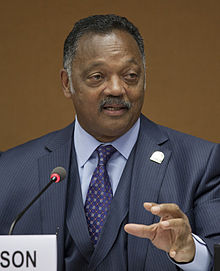 The Rev. Jesse Louis Jackson, Sr., founder and president of the Rainbow PUSH Coalition, is one of America's foremost civil rights, religious and political figures. Over the past forty years, he has played a pivotal role in virtually every movement for empowerment, peace, civil rights, gender equality, and economic and social justice.
The Rev. Jesse Louis Jackson, Sr., founder and president of the Rainbow PUSH Coalition, is one of America's foremost civil rights, religious and political figures. Over the past forty years, he has played a pivotal role in virtually every movement for empowerment, peace, civil rights, gender equality, and economic and social justice.
On Aug. 9, 2000, President Bill Clinton awarded Reverend Jackson the Presidential Medal of Freedom, the nation's highest civilian honor. He is known for bringing people together on common ground across lines of race, culture, class, gender and belief.
Born on Oct. 8, 1941, in Greenville, SC.., Jackson graduated from the public schools in Greenville and then enrolled in the University of Illinois on a football scholarship. He later transferred to North Carolina A&T Stae University and graduated in 1964. He began his theological studies at Chicago Theological Seminary but deferred his studies when he began working full-time in the Civil Rights Movement with Dr. Martin Luther King, Jr.
Rev. Jackson married his college sweetheart Jacqueline Lavinia Brown in 1963. They have five children: Santita Jackson, former Congressman Jesse L. Jackson, Jr., Jonathan Luther Jackson, Yusef DuBois Jackson, Esq., and Jacqueline Lavinia Jackson, Jr.
Kam Williams: Hi, Reverend Jackson, thanks for the interview.
Reverend Jesse Jackson: Thank you, Kam.
KW: What plans do you have for this year's economic summit?
JJ: First, to gather people to discuss the new economic agenda. We just got through the political agenda with the inauguration of President Obama. Now, we have to deal with the economic agenda. No access to capital, needing more access to technology, etcetera. We want to call the banks to invest in America. In 2009 we had 600 black dealerships, today we have 200. We have lost TV and radio stations. We must re-strategize.
KW: Given that we now have an African-American president and black billionaires, is this a post-racial society?
JJ: We don't have a lot of black billionaires, actually. We are not in a post racial society. We are a multi-racial society and substantially racist. We still need to access jobs and contracts-–all those level playing fields are very much needed.
KW: What would you say is the #1 economic issue African-Americans are facing today?
JJ: Access to a jobs. Next, the recovery of houses lost when the banks
targeted our homes and businesses that move our future forward.
KW: Do you see Wall Street as being at odds with Main Street, or can the 1 percent be a part of the solution for the woes of the 99 percent?
JJ: The 1 percent have received their needs through greed and lack of regulations--too few have too much and more have none. It's too unequal and unbalanced. The middle class is sinking. A dormant few are at the bottom.
KW: Thanks again for the time, Reverend Jackson, and best of luck with the Economic Summit.
JJ: Thanks.
- Home
- News
- Opinion
- Entertainment
- Classified
- About Us
 MLK Breakfast
MLK Breakfast- Community
- Foundation
- Obituaries
- Donate
04-19-2024 7:25 pm • PDX and SEA Weather






















































































































































































































































































































